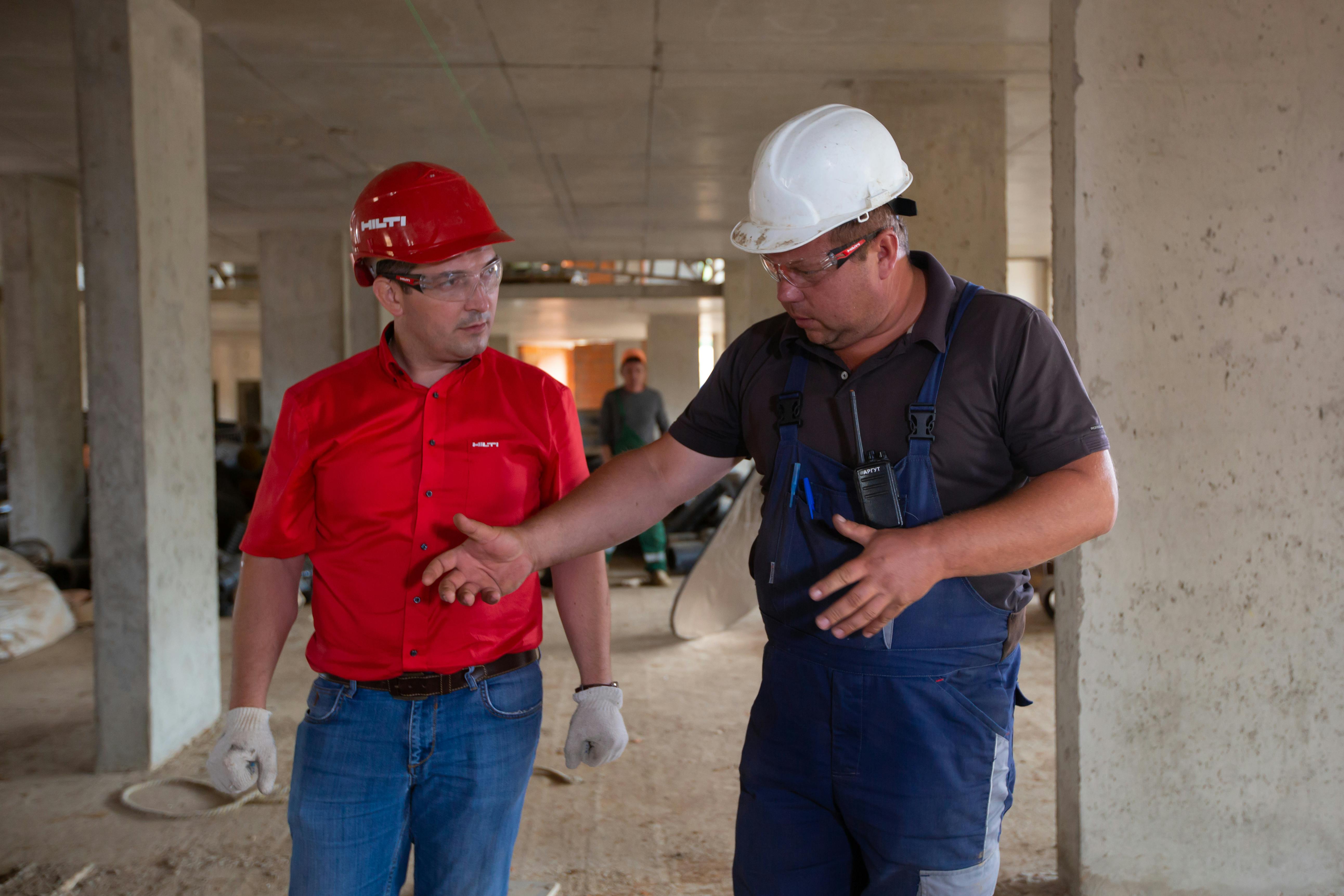Categories
PodcastPublished October 24, 2025
Happy House Hacking Podcast EP 41: Hiring a Contractor: Your Guide to Successful Home Projects

Link to full podcast episode here:
Hiring a Contractor: Your Guide to Successful Home Projects
Dreaming of transforming your current home into your ideal living space? Perhaps you're considering adding an accessory dwelling unit (ADU) to your property for extra income or multi-generational living. Whatever your vision, navigating home improvement projects can be a complex endeavor, and one of the biggest decisions you'll make is hiring a contractor.
At The Schwaegerle Team, we understand firsthand the excitement and challenges that come along with home improvement projects. That's why on this episode of the Happy House Hacking podcast, we sat down with general contractor Charlie Johnson, owner of C3 Constructions. He gave us an insider's perspective on how to successfully tackle your next home project and, most importantly, how to choose the right professional to bring your vision to life.
Johnson’s Construction Story
Johnson's journey into construction began remarkably early at 18 years old. His stepdad had a company, and they worked for big companies doing projects like military bases. This early exposure provided an invaluable learning experience, as Johnson stated, “I learned a lot because…I was on the job from start to finish. So I got to see all the phases at an early age and…was able to learn and see all the stuff from beginning to end, which is important.”
This comprehensive background allowed him to develop a deep understanding of the entire construction process. In 2003, he got his license and started his own business, and he’s been going strong ever since.
Understanding the Role of a General Contractor
A general contractor often serves as a "one-stop shop," overseeing home improvement projects from initial dirt work and concrete to framing and finishing. They manage all aspects, coordinating trades to ensure quality and timely completion.
Becoming a licensed contractor involves a rigorous process. Johnson shared his own experience, noting it took him about a year to even get a test date for his Class B (general construction) license. Later, he wisely obtained a Class A (engineering) license, which permits work in public areas like sidewalks, streets, and utility lines. 
The Critical Importance of a Licensed Contractor
Licensing is paramount. The risks of hiring a contractor who is unlicensed are substantial and, unfortunately, often lead to more significant construction costs and headaches in the long run. "It's so tempting to go with...half price," Johnson admits, but cautions, "Sometimes you get what you pay for."
To illustrate this, Owen Schwaegerle talked about a time when The Schwaegerle Team thought they could save some money by going with another individual who claimed to be licensed and capable of handling all aspects of the project. Owen shared, “It’s a painful one where we thought we could save some money and go through this other guy. He told us he was licensed and he said he could do it all. And then we find out he wasn't even licensed.” This fraudulent claim not only led to poor workmanship but also cost double, even triple, at the end because everything had to be redone.
Identifying a Good Contractor
Performing due diligence when hiring a contractor is non-negotiable. Always ask for and verify a contractor’s license. You can easily check the California State License Board website to look up their number and ensure that the names align.
Beyond licensing, request and speak with multiple references, ideally three to five previous clients. While some contractors, like Johnson, may not have formal portfolios, their reputation and word-of-mouth referrals are key. Ultimately, prioritize integrity and honesty in a contractor, as these qualities are invaluable for a smooth and successful project.
Another key indicator of a good general contractor is the work ethic of their crew and the consistent quality of their workmanship. Ideally, you want a team that shows up on time and works diligently throughout the day. You can see this dedication with Johnson's crew, a stark contrast to other experiences where workers might leave early or claim hours they didn't actually work.
To build trust, some reputable contractors might even suggest a trial period, as Johnson does. He tells potential clients, "Let's do two weeks and let's see where we're at and how you're feeling," offering transparency and ensuring you're comfortable with their process. 
Navigating Home Improvement Projects and Construction Costs
Many homeowners get excited about home improvement projects like adding rooms. However, the reality often involves underestimating the extensive process and significant construction costs.
Building permits and planning are crucial first steps. You must consult your local planning department to confirm if your project is even permitted in your zoning. This initial check saves time and money, as they'll explain rules and requirements (e.g., basement egress).
Hiring a contractor to guide you in retaining professionals like draftsmen and architects is necessary for code-compliant plans. Structural engineers might also be required. And the timeline for construction permits can range from weeks for small jobs to months for full house constructions, varying by locality.
Current construction costs are a major factor. Johnson noted a dramatic per-square-foot increase, from around $200 per square foot ten years ago to about $500 per square foot today, even reaching $1,000 per square foot for luxury homes. Unfortunately, costs show no signs of decreasing due to material tariffs and other factors, directly impacting home prices.
Construction Payment Structures
Understanding payment structures is another key differentiator when hiring a contractor. Contractors typically use either a time and material (T&M) model or a fixed bid.
- Time and Material (T&M) Explained: In this model, the contractor bills for the actual time spent by workers and the materials used. This can be more transparent if the workers are efficient and honest. The main challenges here are clients' potential wariness and the risk of dishonest workers.
- Bidding Explained: With a bid, the contractor provides a fixed price for the entire project upfront. While seemingly straightforward, contractors often “pad” bids to account for unforeseen costs and material fluctuations.
Navigating today's volatile market, especially with tariffs and unpredictable material costs, greatly affects how projects are priced. It's tough for contractors to guarantee fixed bids when tariffs on imported goods—like lumber, gypsum, and appliances—can drastically increase overall construction costs, making fixed bids a gamble for contractors and potentially unfair to clients. In such an unstable environment, a time and materials (T&M) approach can be more fair, as it distributes the risk between the client and the contractor.
Accessory Dwelling Units (ADUs)
Adding an accessory dwelling unit (ADUs) is popular for maximizing property potential and generating rental income. While beneficial, they come with significant construction costs. Even a small 300 square foot accessory dwelling unit can cost around $120,000, with per-square-foot prices potentially higher for smaller units due to fixed expenses. Options for accessory dwelling unit construction include:
- Prefabricated (Prefab) ADUs: These pre-made kits can save money and are gaining popularity, even in luxury segments.
- Ground-Up Construction ADUs: Custom-built for specific lot needs, though they face the same high per-square-foot construction costs.
- Conversions (Garage, Basement, Attic): A smart use of existing space, but requires careful adherence to local rules, egress, and window requirements.
To save money on an accessory dwelling unit, Johnson suggests checking with your local planning department for pre-approved ADU plans. This can reduce architect fees and streamline construction permits.
Pro Tips for Your Next Construction Project
Based on our discussion with Johnson, there are a few pro tips for anyone considering their next home improvement projects. These insights will help ensure a smoother and more successful construction experience:
- Due Diligence on Contractors: This bears repeating: verify licenses rigorously. When hiring a contractor, ask for and diligently follow up on references, especially for their most recent projects. Remember that integrity and honesty in your chosen contractor are priceless.
- DIY and Self-Tackling Projects: If you're inclined to tackle some aspects yourself, utilize online resources like YouTube for tutorials. Be aware that inspectors will ensure your work meets code. For more complex elements, consider hiring a contractor as a consultant who can provide guidance and oversight.
Making Your Home Project Dreams a Reality
Embarking on home improvement projects or adding an accessory dwelling unit can significantly enhance your property and financial well-being. The key to successful home improvement projects lies in making informed decisions, particularly when it comes to hiring a contractor. Understanding current construction costs and meticulously navigating the construction permits process are also crucial steps.
At The Schwaegerle Team, we are committed to helping people in California navigate the path to happy homeownership, and that includes guiding them through the exciting world of home improvement projects. If you want to learn more about real estate in our beautiful golden state, be sure to listen to the rest of our Happy House Hacking podcast!





